- Home
- Sean Platt
Unicorn Western Page 3
Unicorn Western Read online
Page 3
“More like a game of trivia. Stone held trial on the rare occasions when someone dared cross him, or sometimes to celebrate another day ending in Y. Stone’d stop men in the street, usually outside the saloon, putting his pistol to their skulls and pulling the hammer back with a quiet click you could nearly hear through the town. A crowd would gather, of course, since that’s what crowds do even when they hate what they see. Stone would ask the man, down on his knees, how many posts were in front of the post office, or something else equally irrelevant. The man would either get the answer right and live, or get it wrong and die. Either way, the citizens of Solace learned it was futile to wiggle beneath Stone’s heel.”
Clint turned from the window.
Mai said, “Why didn’t the people rise up? Weren’t there more of them than there were of the bandits?”
“Who ever rises up?” said Clint.
“So you came to town and…”
“Edward and I came to town a while after our exile. When we found Solace, I near wanted to die. Good thing for the town, I wasn’t willing to suffer a man like Stone sucking air under the same sun as me. We meant to pass through, on our way to deeper Sands, looking for a bed and pie. But the first thing that set my nerves to raw was how the place was quiet as a turkey graveyard. Then, we were welcomed into town when Stone himself stepped into the street and fired three slugs into Edward’s chest.”
Clint nearly smiled at the memory. Edward had looked down at his wounds, his horn glowing as the three slugs rose through his skin and fell to the dirt. The unicorn’s blood-matted hair had swirled blue and red and green and yellow as Edward stared up into Stone’s eyes. Both Clint and Edward realized Stone held the same fool belief as most folks — that a unicorn was only a horse with a horn.
Edward could have killed Stone with his own slugs, but Clint’s unicorn thought it was funnier to watch Stone run, which he did the second he saw the slugs hit the dirt.
Edward had let him go, then said to Clint: What a jerk. Now I need an apple brew.
Mai didn’t gasp when Clint told her Stone had shot Edward. She laughed, knowing his unicorn.
“It didn’t take us long to drive the bandits out of the town,” Clint said. “Edward wouldn’t even help. He walked straight from the center of the street where Stone had shot him and into the saloon, then pushed all of the tables and chairs out of the way and told the barman he wanted a tall apple brew and a fat slice of turkey pie. The barman was so shocked that he served Edward his brew in a mug. Edward asked for a clutch of straws and drank it that way, then stayed there the rest of that day and all of the next one. I tried getting him to help me with Stone, but he wouldn’t leave his sour mood behind. His coat was filthy, with rainbow-colored blood caked on his chest. He never washed — just stood by the bar and drank mug after mug of apple brew and ate them plum out of turkey pie. I told him we had a town to clear. He said I should try my best to avoid a mortal wound, and that he’d heal me like always if I got shot otherwise. I told him we could get done faster if he’d help, and he asked me what I was talking on since he was already done.”
Clint told Mai the rest of the story — how he’d hunted Stone’s men and taken them down, one by one. He told her about the three times he’d been shot, once square in the gut, and how each time he’d crawled back to Edward, who would only heal him after another round of ridicule. He told her about the time Stone nicked him in a lung, and how he almost hadn’t made it back to Edward’s new home in the saloon — and how when he had, catching up to Edward while he occupied the entire bar area of the saloon, the unicorn had laughed louder than ever, suggesting the gunslinger wear a stove plate over his heart if he insisted on continuing to fight.
Now, Clint pointed outside and finished his story, telling Mai how his final showdown with Stone had happened right there in the street below, in front of the saloon boardinghouse. He’d turned into Stone’s bullet as the bandit had fired, deliberately taking the fourth shot in the shoulder and falling. Then he told her how, when Stone kicked his seven-shooter away, he’d fired from his other side.
After a faded red billow of gunslinger’s smoke from the marshal’s gun, Stone had fallen. Clint stood, yelling for Edward. The unicorn healed him from the saloon without bothering to emerge. Clint, standing over a moaning Stone, had fired once more, slamming Stone with a bullet in his opposite arm. He’d told Stone to go, to get out of town before he bled out, and that if he ever found the strength in his arms to hold a weapon again, Clint would find and end him by sundown.
Mai let him finish, then stood and dragged a suitcase out from under the bed.
“What are you doing?” Clint asked.
“Packing. Leaving.”
“That’s my suitcase,” he said.
“Of course. It’s you that’s going. I only have a few things at the Otel. We’ll go there next, and be gone before Stone shows his face back in Solace.”
Clint shook his head.
“If he’s at all magic — or simply not a fool — he’ll be ready for you this time. He’ll know your unicorn can’t help you if he kills you outright. If this man is really coming back, you’d be an idiot to be here when he does.”
“Mai. I can’t leave. He’ll end this town. All of it. He won’t just take what he wants this time. He’ll kill what he can’t take, and he’ll let the bodies rot.”
“You said his grudge was with you.”
“His grudge is with the world.”
“This isn’t your fight,” she said. “Not anymore. You were to surrender your guns and unicorn in the morrow, no longer riding the Sands as a marshal. We were to leave.”
“Yar’m,” he said. “But we didn’t.”
Mai huffed, cursing the Water Reader and saying that if he could have just waited a few hours longer to disturb the town, they’d be married and Clint would have already handed his marshal’s star and guns to Todd, trading them for a citizen’s six-shooter and a horse. When word of Stone’s return came, the couple would already be well on their way toward Sojourn, off to start a new and delightfully dull rest of their lives.
“I spent most of my life in the deep Sands,” she said, “and in the deep Sands, the one thing you learn is that running keeps you breathing. Flight isn’t cowardice so much as a second chance. I survived without parents in the middle of the Sprawl because I knew when to run, and therefore live to fight another day. How will you help anyone if you die?”
“How will I help anyone if I leave?”
“Rally others. Report to Sojourn authorities. You could even come back. But if you stay now, you don’t stand a chance. How is that the right choice, in any sense?”
“Running’s a coward’s move.”
“Your pride! By the Sands!”
“You know me, Mai. I can’t leave the town nekid in a coming rain.”
“They have Todd!”
“Todd’s an idiot,” said Clint. “And Edward will never listen to him. Edward will watch him get shot while trying not to laugh. You think I have pride? Unicorns make me look penitent, and Edward makes most unicorns look like groveling fools. I can hand someone my guns, but Edward can’t be handed to any man. He has the choice to stay for the next marshal or to run back. He’ll run back. He’s not with me as a matter of duty, you understand. He’s with me because what we have is friendship, held together by mutual loathing.”
Mai’s face curled in surrender. She was holding one of his shirts, and set it on the bed, neither back in place nor in the suitcase. She walked to the door, then turned back, once again blinking tears from her eyes. This time, Clint had no idea why they were there.
“We’re to be married,” she said.
“Someday soon, we will be,” he promised.
“Come with me to Sojourn. Please, Clint. Like you promised. We’ve already hired the carriage. It’ll be ready shortly. We can still go, just climb inside and not look back. You and me, Clint. Pretend the preacherman made it through the last two minutes of the vows. Pretend the Reader said nothing.�
��
“But he did.” Clint shook his head. “He said too much, and now that I’ve heard it, I can’t leave Solace.”
She sighed, and opened the door.
“I’m going to the Otel,” she said. “When the carriage is ready, I’ll be taking it to Sojourn. You have that long to do the right thing, Clint. That long to change your mind.”
“I’m all that stands between Stone and these people.”
She swiped a tear from her eye. “I can’t watch you die.” She shook her head. “I won’t.”
“Then don’t,” he said. “Watch me live.”
CHAPTER THREE:
THE POSSE
Clint pulled open the door to Edward’s house five minutes later.
In truth, Edward’s house was a barn, and Edward’s room a stall, but Clint had never heard of a unicorn who used either of those base words. Horses lived in stalls inside of barns, and horses were disgusting. Horses crapped in the same rooms where they slept, whereas unicorns did their toilet business in the yard. Horses drank discolored water from plastic buckets. Unicorns lapped clean water from a foot-operated pump over an immaculate metal trough. Horses ate hay. Unicorns also ate hay, but only when there was nothing better in the offing. They loved brew and all sorts of pie, from dinner to dessert.
“Edward,” said Clint, catching his breath. “We’ve got a problem. The Water Reader says…”
A thirty-pound bag of oats flew across the stable, striking Clint in the face and sending him to the barn’s packed clay floor.
Clint stood, brushed himself off, and peeked around the corner, where he nearly ran into Edward’s enormous white rump. Edward looked back at Clint over his shoulder, his spiraled horn pointing at Clint in accusation.
“It’s me,” said Clint.
“I know,” said the unicorn. His dry, gravelly voice was eerily similar to Clint’s. People often confused them, much to Edward’s delight whenever he quietly sauntered up behind women, making crass come-ons in the name of the marshal, always falling into hysterics as they turned to look at and/or slap him.
“I’m your partner. You hit your partner with a sack of oats?”
Edward lowered his lips into the trough and began sucking up water. A soft glow spread in a small cloud from his head, and sent the same sack of oats flying at Clint. It struck him again, this time launching him into Edward’s rear.
“Apparently,” Edward said.
“I demand that you stop!”
“Good one,” said Edward, his eyes still on the water. The only sounds in the stable were Clint’s heavy snarl and the vague sucking sound of equine drinking. Clint slapped Edward’s hindquarters lightly. “Edward. Back out so I can stop talking to your butt. Come on.”
“No.” Slurp.
“Edward.”
“Clint.”
“I need to talk to you. This is important.”
“Tell it to your new horse.”
So that was it.
“I keep telling you, you can come with us. I just can’t ride you once I’m no longer a marshal.”
“Didn’t stop you before we came here. Before you got a new official badge, from the townspeople of Solace,” said Edward’s butt. “Besides, you apparently don’t understand the meaning of an unridden unicorn who keeps the company of humans. If you’re not a companion, you’re a hanger-on.”
Clint said nothing, waiting for the unicorn to finish pouting.
“When I was growing up, there was a foal with a deformed horn. His name was William, but that didn’t matter since all the unicorns called him ‘Stumpy’. He’d hang around with groups that didn’t want him, but that didn’t have the heart to reject him.”
“I don’t have time to talk about this right now,” said Clint.
“Of course you don’t,” Edward said. The sack of oats hit Clint a third time, knocking the gunslinger forward hard enough to drive his face fully between Edward’s cheeks just as the unicorn loudly saluted from his rear.
Clint fanned his hand in front of his face and began squeezing around Edward’s bulk. He moved up toward his head, maneuvered in front, placed his hands on Edward’s face, and pushed.
“Really? Really,” Edward laughed. “I weigh seven times what you do and I’m magic. You’re going to try pushing me out by force? Would you like me to wear a halter to make it easier?” The unicorn twisted his voice into that of a damsel-in-distress. “Yar, master, tell me what to do!”
“I’m not going to leave you alone,” said Clint, still pushing.
“You’re underestimating my ability to ignore you,” said Edward.
“I’ll urinate in your water trough,” said Clint.
“I’ll rinse it out.”
“Really? You think you’ll ever be able to get it clean enough?”
Edward was mildly obsessive-compulsive. He fussed with coasters until they were centered exactly under mugs and glasses. Even though he was a magical creature, he constantly used his hooves to knock on wood whenever he realized he might be close to counting chickens before they hatched. No way he’d ever feel comfortable enough to use a trough or spigot knowing it was peed on.
Edward sighed. It was an odd noise, hearing a unicorn sigh.
“Fine. Out in the yard. You go first or I’ll crush you.”
“Just be careful and you won’t crush me,” said Clint, sucking in his gut so Edward could back out of the stable.
“I wasn’t talking about an accident that might happen,” said Edward. “I was making a threat.”
Clint, happy to have at least gotten Edward into a back and forth, squeezed out the way he’d come. Then he led the unicorn out into a small pasture, even though he knew it was actually a garden because pastures were for horses.
Once together in the hot midday sun, Edward faced Clint and waited for the gunslinger to speak. His always-pristine coat was so bright that he was hard to look at, and Clint had to squint until his eyes adjusted. The animosity still in the unicorn’s eyes made his pearlescent, spiraled horn look extremely sharp.
Clint figured Edward wanted him to speak first — a power move, since he hadn’t wanted discussion.
“Hassle Stone is returning to town,” said Clint.
“Fabulous.”
“He’ll want to kill me. And you.”
Edward laughed.
“He’ll want to kill everyone in town, or make them his toys. You remember what it was like when we arrived.”
“My days as a do-gooder are over.”
“I’m still the marshal. I intend to do what I can. You’re still the marshal’s…” He had to be careful how he said this. “… deadly sidekick.”
“Sidekick?” said Edward.
“Ultimate weapon. Head honcho. Name your title.”
Edward said, “I don’t want to fight Hassle Stone. I want to go to the saloon and drink. You can come with me. We’ll ring out the end of our partnership in style.”
“What better way to end our partnership than by committing one final heroic act?” said Clint. “Save the town. That’s how two law… law-beings? should go out in style. Beings. Hmm. I’m sorry; I don’t know any terms that cover both men and unicorns.”
“Hassle Stone bores me,” said Edward. “He was a simple bandit, and barely a challenge. You’ll get on my back, I’ll extend my protection, they’ll shoot at us, we’ll be impervious, you’ll shoot back, and then he’ll die or run. Once upon a time, the end, any questions, etc.”
“No reason not to help me, then.”
Edward scraped his hooves in the dirt, looking far more horselike than Clint dared to point out.
“Fine,” said the unicorn.
“There’s more to it, though.”
“Of course.”
“Stone won’t come alone, and he’ll know what he’s facing this time. He’ll bring men. Lots of men. Dozens. He can’t come straight at us, so he’ll go after others and hold knives to their throats or pistols to their heads. You can’t protect all of them.”
“You say that as though I would care to,” Edward said. His horn started glowing a soft yellowish-pink, and a metal object flew toward him from the barn. It was a can of apple brew, fashioned from city metal. Edward used his magic horn to set the can in front of him, then held it deftly between his teeth, raised his head, and bit it open, drinking the apple brew as it spilled.
“You need to stop drinking if we’re going to do this,” said Clint.
“I weigh fourteen hundred pounds and am magic,” said Edward. “Get off my back, Mom.”
Clint ignored him. “We’ll need men to match Stone’s. Two dozen at least.”
“Sure.”
“Let’s ride out and get them.”
Edward said, “Peachy” as his horn glowed again. Clint found himself flying through the air and landing roughly on Edward’s back, facing the wrong way, seconds before Edward trotted off.
Clint turned and righted himself, adjusting to find the fit between his bones and Edward’s. It had taken him a long time to learn to ride bareback without reins, but the one thing even a gunslinger would never dare — and that a unicorn would never permit — would be to garb a unicorn in human paraphernalia.
As far as unicorns were concerned, saddles and reins and bits and bridles and spurs were implements of slavery, and there was an ongoing tension between unicorns and humans regarding humans’ use of those instruments on horses. Horses were unicorns’ dumb cousins — but remained cousins regardless of their mental ineptitude. With unicorns, the issue was straightforward: ride bareback, or don’t ride at all.
Within minutes, Edward had trotted them over to Earl Lancaster’s place. Earl had a small tack shop on the main street and lived in the four-room apartment above the store. Earl would help. He was big and strong and fast. Always a quick draw. He even had an illegal six-shooter — a second gun — that Clint knew of but strategically ignored. Today his feigned ignorance would pay off. He’d allow Earl to wear it openly if he’d battle with Stone.
Earl answered the door with his hair in tufts, apparently just waking to answer from a midday nap. He yawned, then saw Edward standing in the street behind Clint. He snapped awake, suddenly serious.

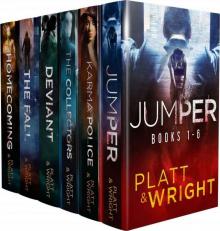 Jumper: Books 1-6: Complete Saga
Jumper: Books 1-6: Complete Saga WhiteSpace Season One (Episodes 1-6)
WhiteSpace Season One (Episodes 1-6)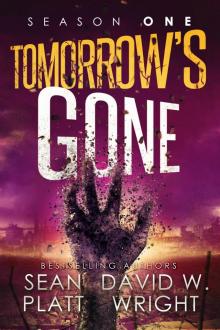 Tomorrow's Gone Season 1
Tomorrow's Gone Season 1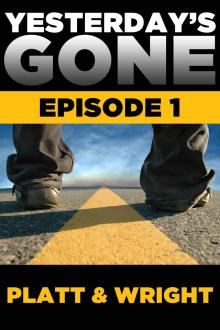 Yesterday's Gone: Episode 1
Yesterday's Gone: Episode 1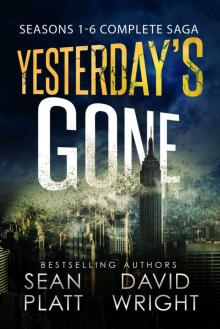 Yesterday's Gone: Seasons 1-6 Complete Saga
Yesterday's Gone: Seasons 1-6 Complete Saga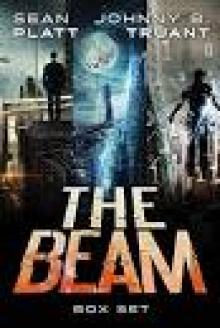 The Beam- The Complete Series
The Beam- The Complete Series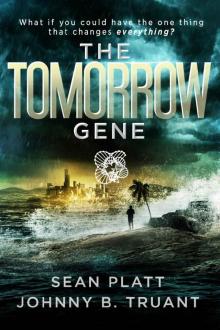 The Tomorrow Gene
The Tomorrow Gene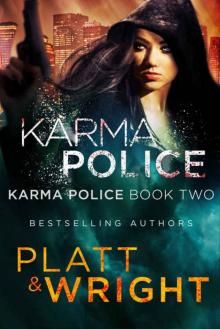 Karma Police: Karma Police Book Two
Karma Police: Karma Police Book Two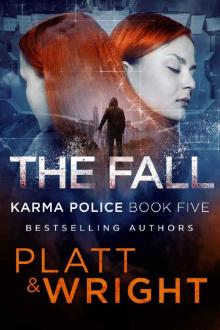 The Fall (Karma Police Book 5)
The Fall (Karma Police Book 5)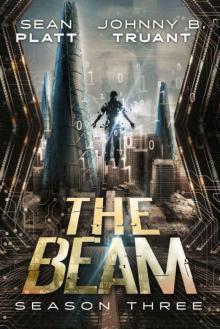 The Beam: Season Three
The Beam: Season Three Resurrection
Resurrection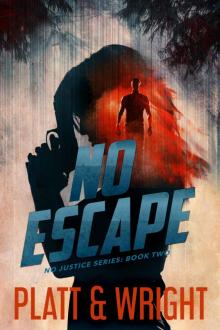 No Escape (No Justice Book 2)
No Escape (No Justice Book 2)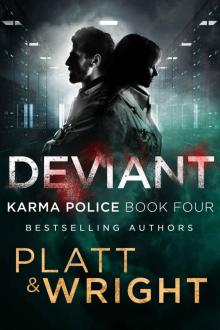 Deviant (Karma Police Book 4)
Deviant (Karma Police Book 4)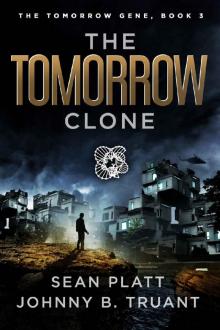 The Tomorrow Clone (The Tomorrow Gene Book 3)
The Tomorrow Clone (The Tomorrow Gene Book 3)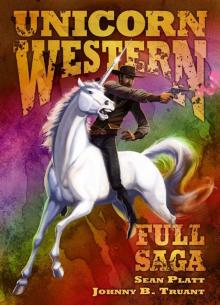 Unicorn Western
Unicorn Western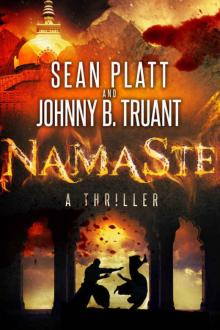 Namaste
Namaste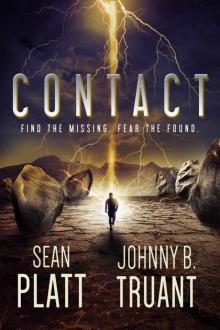 Alien Invasion (Book 2): Contact
Alien Invasion (Book 2): Contact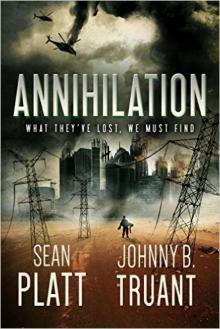 Alien Invasion (Book 4): Annihilation
Alien Invasion (Book 4): Annihilation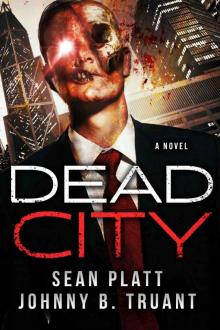 Dead City
Dead City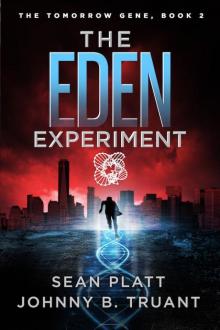 The Eden Experiment
The Eden Experiment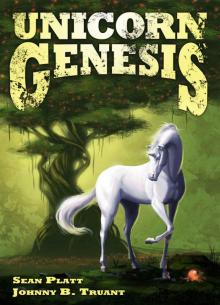 Unicorn Genesis (Unicorn Western)
Unicorn Genesis (Unicorn Western)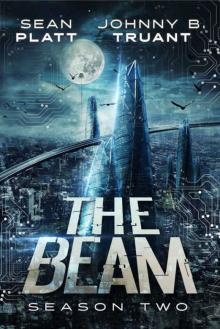 The Beam: Season Two
The Beam: Season Two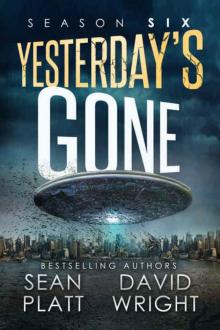 Yesterday's Gone: Season Six
Yesterday's Gone: Season Six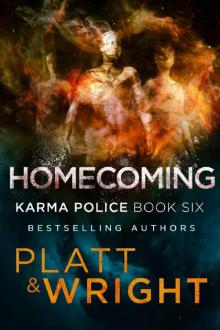 Homecoming (Karma Police Book 6)
Homecoming (Karma Police Book 6)![[Alien Invasion 01.0] Invasion Read online](http://i1.bookreadfree.com/i1/03/30/alien_invasion_01_0_invasion_preview.jpg) [Alien Invasion 01.0] Invasion
[Alien Invasion 01.0] Invasion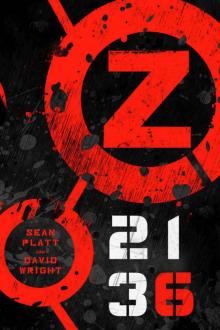 Z 2136 (Z 2134 Series Book 3)
Z 2136 (Z 2134 Series Book 3)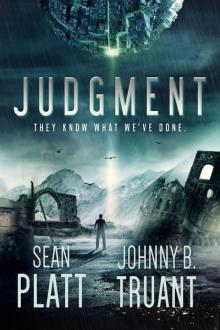 Alien Invasion (Book 5): Judgment
Alien Invasion (Book 5): Judgment Threshold
Threshold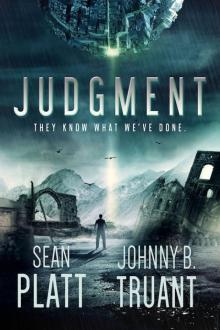 Judgment
Judgment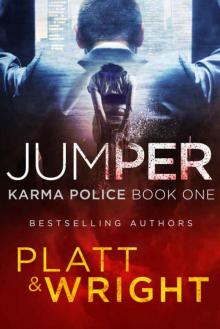 Jumper: Karma Police Book One
Jumper: Karma Police Book One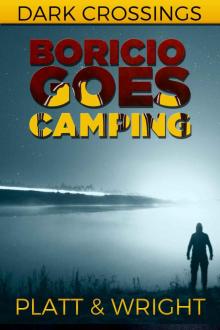 Boricio Goes Camping (Dark Crossings)
Boricio Goes Camping (Dark Crossings)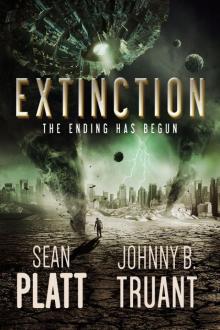 Extinction
Extinction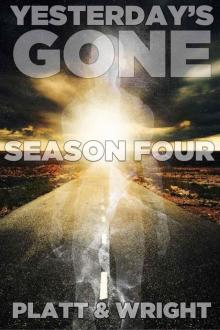 Yesterday's Gone (Season Four): Episodes 19-24
Yesterday's Gone (Season Four): Episodes 19-24![[No Justice 01.0] No Justice Read online](http://i1.bookreadfree.com/i2/04/09/no_justice_01_0_no_justice_preview.jpg) [No Justice 01.0] No Justice
[No Justice 01.0] No Justice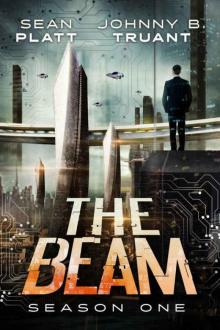 The Beam: Season One
The Beam: Season One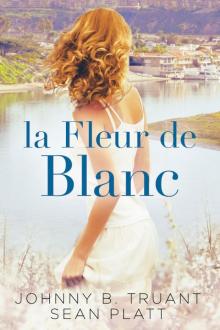 La Fleur de Blanc
La Fleur de Blanc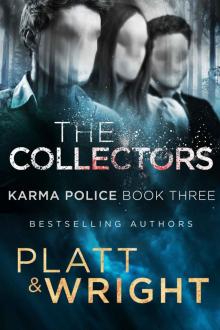 The Collectors (Karma Police Book 3)
The Collectors (Karma Police Book 3)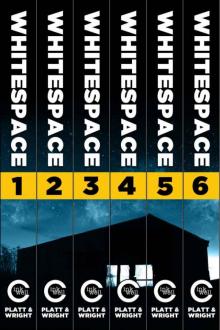 WhiteSpace: Season One (Episodes 1-6 of the sci-fi horror serial)
WhiteSpace: Season One (Episodes 1-6 of the sci-fi horror serial)